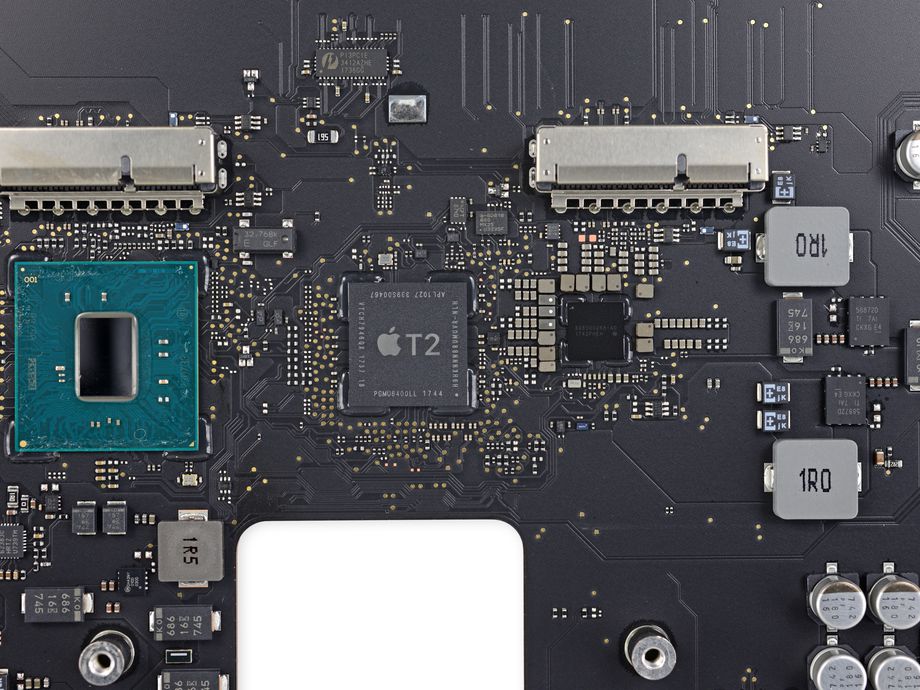Apple: T2 coprocessor can block DIY-repair of new MacBook and MacMini

The last Apple event, which featured updated MacBook Air and Mac mini models, was held with the usual solemnity for the company. Both devices, as well as the MacBook Pro and iMac Pro, shown earlier, are equipped with a T2 chip. Chip, according to representatives of the corporation, increases the level of user data security. T2, in fact, is a co-processor that “specializes” in information security.
A little later, it turned out that the developers of the new Apple systems widely understand the term “information security”. In particular, the company introduced a new measure - blocking the possibility of repairing devices by unauthorized service centers and ordinary repairmen. They found out about this almost by accident.
On Habré already published information that it might not be possible to replace some elements of the new devices in the near future. The fact is that before loading OS T2 checks the authenticity of all elements of the system and if something turns out to be non-original, then the laptop simply does not work.
')
Experts believe that in fact the company was guided not by the desire to protect its customers from external threats, but by the desire to take the reins of government from service centers specializing in apple technology in their hands. Unfortunately, the company cannot (or does not want) to provide a list of all types of repairs that are impossible due to the replacement of certain elements of devices.
Now you can repair anything - the threat of blocking "non-native" elements only in the plans , but they can become a reality at any time, although the company does not say when this will happen.
T2 is a complex element that, among other things, is responsible for handling fingerprints. It also saves the cryptographic keys that are needed to securely boot devices. T2 also does not allow hackers to use laptop microphones remotely if the lid is closed. Well, in order to regularly conduct a security audit, T2 constantly keeps in touch with other components.
As for the “right to repair”, Apple told about blocking the possibility to repair the device on its own using Apple in one of the documents that fell into the hands of journalists. According to this document, T2 will not allow the system to boot if, for example, a motherboard or another component is replaced. Repair can only be done with a special cloud software, access to which is available only from Apple employees and authorized centers. It is now known that the company is against self-replacement by users of the laptop display, motherboard, TouchID board, flash drive. Most likely, it will not be possible to solve the problem with the breakdown of the motherboard, after the introduction of a specialized protocol with a repaired third party or company, the laptop will not work.
It is worth noting that the opportunity to repair Apple systems was discovered by representatives of the iFixit repairmen community. They dismantled a new laptop, changed some elements of the design and collected it back. After that, everything worked as it should, without blocking by Apple. “To our surprise, everything worked well, no matter what combinations of individual elements (original or not) we made,” representatives of iFixit said.
Unfortunately, the representatives of the service did not replace the motherboards in the devices - in this case it would be clear if the system could boot in such conditions. Representatives of iFixit believe that Apple's new idea is the desire to concentrate all financial flows from the repair of its own technology in its own hands.
Previously, difficulties arose only in the case of replacing buttons in Apple's smartphone models, starting with 5S. Replace the button with the preservation of its functionality can only employee of the corporation. An ordinary person can do almost nothing. A similar situation may arise with other elements of the corporation’s devices if it decides to “protect against hacking”.
Whatever it was, but there is an opposite point of view on the possibility of repairing complex electronic devices on their own. For example, Motorola not only does not interfere, but even helps to carry out repairs on its own.
What will happen next in relation to the policy of Apple about the free repair of their products by third-party organizations and individuals - it remains only to guess.
Source: https://habr.com/ru/post/429812/
All Articles